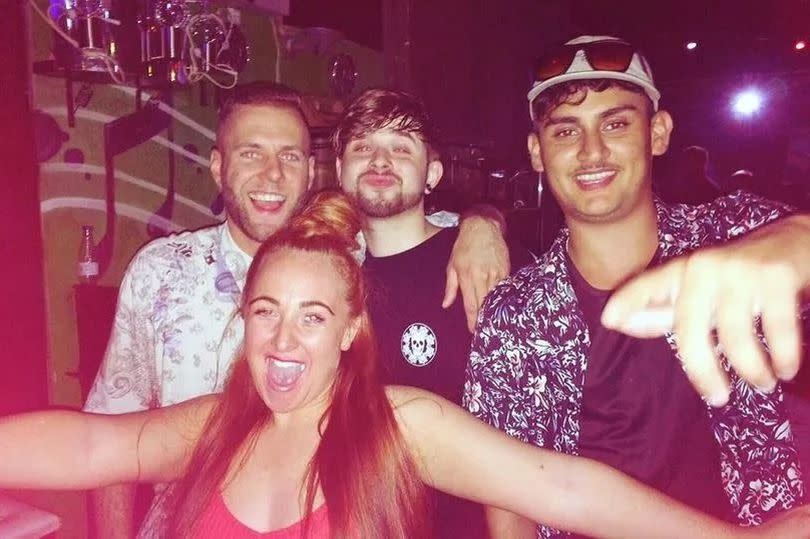The mum who went out with her friends on a hot summer day and never came home

It was a sweltering hot Saturday in late June when Stephanie Thorpe met her friends at a pub in Farnworth.
The group had arranged to meet before going to the Restricted Forest dance music festival in Blackburn and the mum was excited for what fun lay ahead.
On the way to the event, Stephanie took half of a White Dove ecstasy pill - completely unaware it would end her life just hours later.
Join our WhatsApp Top Stories and Breaking News group by clicking this link
Despite the desperate attempts to save her, the much-loved mum's temperature soared to 42 degrees before she died. She was just 32 years old.
An inquest into her death held this week heard how Stephane would have had little idea of the horrific game of roulette she was playing. With super-strength ecstasy hitting the streets, experts have warned that many who chose to take recreational drugs no longer 'know what they are getting'.
Ecstasy - or MDMA - is a social drug; those who take it tend to do so at parties or festivals. Unlike opioids, such as heroin, ecstasy is not addictive and it is rarely taken other than at big social events.
Its use was curtailed during Covid due to lockdown restrictions. But experts have noted how, following the lifting of restrictions, there has been a significant upswing in the drug's strength.

Pills can now be up to four times' stronger than pre-Covid. For Stephanie, who had taken recreational drugs at music events before, the consequences of the shift proved fatal.
A study in 2002 found that the strength variation in White Dove ecstasy pills - which Stephanie took - ranged wildly from "next to no active ingredients to some which were almost pure".
Dr Mark Clayton is an expert of sorts when it comes to taking ecstasy at music festivals. As well as being a qualified and experienced doctor in emergency medicine, he works alongside event organisers in an attempt to reduce the number of deaths caused by ecstasy use at music festivals.
"There is no way, when you look at a tablet, of knowing how much ecstasy it contains or even what's in it," Dr Clayton said this week at an inquest into Stephanie's death. "Ketamine was present in a not insignificant quantity in Stephanie's blood.
"Ketamine is used to adulterate ecstasy because it produces similar effects; an increase in energy and heart rate. It's added either because it's cheaper or more readily available."
Ecstasy is manufactured in makeshift labs - often in a drug dealer's own home - with little regard for quality control or health and safety. "Ecstasy is made by amateur chemists, perhaps individuals who have a degree of biochemistry training, and who do this as a way of making more money.
"These drugs are being made in people's kitchens. It's not like going in Boots and buying a box of pills made by Pfizer."
Music festival organisers are taking a more hands-on, direct approach to reducing the number of deaths linked to illicit drug use. Since 2014 Kendal Calling has operated a behind-the-scenes drug testing service called The Loop.

Fiona Measham is the director of The Loop as well as a professor of criminology at Liverpool University. She was quoted at the inquest into Stephanie's death after one of her studies discovered a significant increase in the strength of ecstasy pills post-Covid.
Dr Clayton said at the inquest: "Before the pandemic tablets contained between 95mg and 100mg. They're now up to 250/300mg which is a significant upswing. As a festival-goer, you have no way of knowing that what you're taking is safe.
"We find that people rely on past experiences. It's very common for me to meet people in a festival setting who say they have taken it before and were absolutely fine."
Another change noted in ecstasy use is the shift away from attempting to avoid dehydration by drinking lots of water. The theory was that, as ecstasy users were susceptible to dehydration, one should drink plenty of water to prevent it. But drinking too much water can be equally dangerous.
In 1995 the death of Leah Betts hit the headlines when she effectively died from water toxicity caused by drinking too much water after she took ecstasy.
Post-mortem tests revealed that 18-year-old Leah drank upwards of seven litres of water, and because of the drug's effect on her bodily functions, was unable to relieve herself. Leah had taken just one ecstasy tablet.
Dr Clayton explained how Leah's case has affected ecstasy users. "One of the things she died of was water intoxication so people often swing the other way and don't drink enough; it's a fine line to tread," he said during Stephanie's inquest.
Stephanie had taken ecstasy on one of the hottest days of the year. As she danced along to the music she was seen sweating heavily and was undoubtedly dehydrated.
Dr Clayton added: "When you're dehydrated it hyper concentrates all substances in the blood and increases the relative concentration. If the environment is above 20C you are more likely to suffer harm from ecstasy and more likely to suffer serotonin syndrome or a high temperature.
"Once you cross the 20C threshold the risk of harm increases and there were multiple factors at play. Stephanie was dehydrated; she was seen dancing a lot and sweating and it was a very hot day so her ability to lose heat was impaired.
"She was only seen taking half a tablet in the beer garden but once you take the first dose it saturates the system so if you take more those pathways are already working at full capacity. Multi-dosing is related to an increased risk of harm."
The lessons learned from Stephanie's death will, sadly, not bring her back. Nor will they prevent a little boy growing up without his mum but Lancashire's Senior Coroner Dr James Adeley is determined to do what he can to make festivals safer.
Dr Adeley is considering issuing a Prevention of Future Deaths report to all licensing authorities in Lancashire. The expectation is that medical provision and availability of free drinking water will be improved at music festivals.
Speaking directly to Stephanie's friends, and those who do take ecstasy at music festivals, Dr Adeley said: "If you are attending festivals just be careful please. On the other hand I don't want to be an entire killjoy but take it gently please."

 Yahoo News
Yahoo News 
